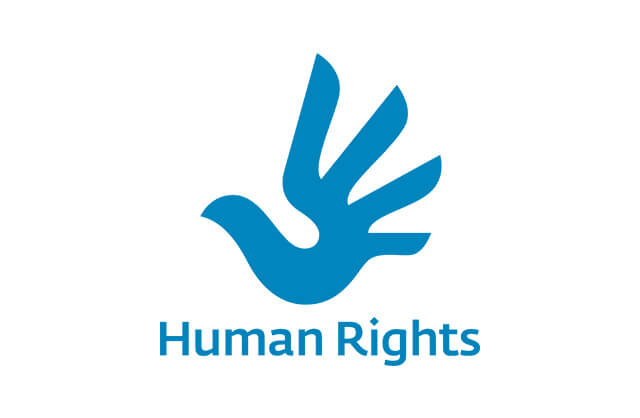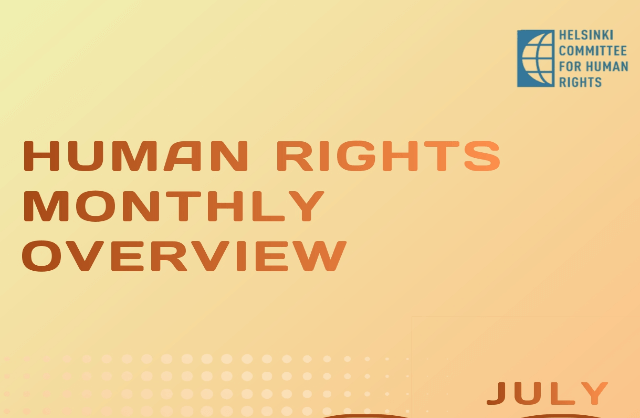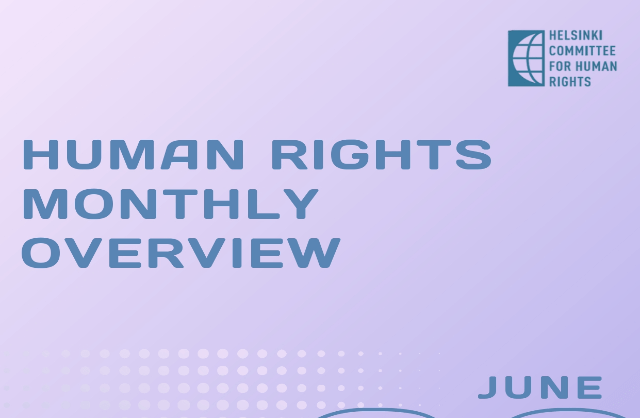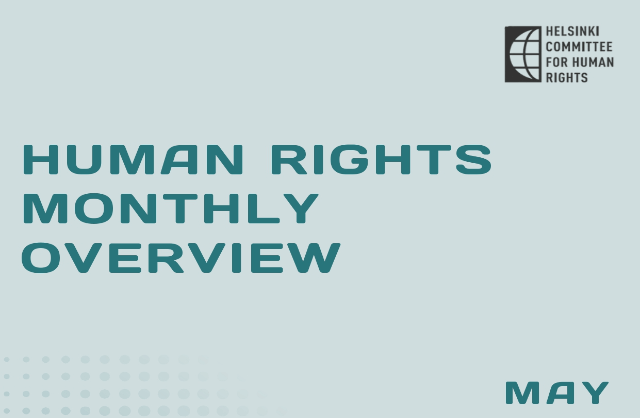Bimonthly Report (September – October 2010)
November 10, 2010

I. PUBLIC EVENTS AND VIOLATIONS OF DEMOCRATIC PRINCIPLES
1.1. Closing the circle
1.2. Where do Macedonian courts make mistakes when pronouncing detention as a measure?
1.3. Introducing indicators for measuring discrimination on local level
1.4. National urgent trauma center – health reforms or just another hasty action of the Government?
II. INDIVIDUAL CASES
2.1. Positive decision in the case of Ms. Sali Anita for receiving parental allowance
______________________________________________________________________
I. PUBLIC EVENTS AND VIOLATIONS OF DEMOCRATIC PRINCIPLES
1.1. Closing the circle
One of the indicators that in our never-ending transition we have not done very much in the transformation of our society from the old (closed) into new (open) is the attitude of the authorities towards the non-governmental sector. Every democratic authority can take advantage of the cooperation with the non-governmental sector for the sake of the citizens, but in environments similar to ours with fragile democracy, for several years in the row the NGOs are trying to point out what is not good in our everyday life in order to move things for the better, while those in power not only disregard these initiatives, but also openly want to shut them up.
Unfortunately, our Committee receives the same “attention” from the authorities, regardless to which party they belong. In several occasions we have pointed out to the facts showing that the authorities are forced to pay due attention to our de facto findings, which sometimes after a while are differently packed by the relevant international factors. It is sufficient to compare our public addresses[1] and the messages of the “foreigners” that mean so much to us.
The recently published 2010 Progress Report of the European Commission for the Republic of Macedonia[2] is full of examples supporting this claim.
In the section referring to the judicial system it was noted that limited progress was made in implementing the reform of the judiciary (a key priority of the Accession Partnership): “Regarding the independence of the judiciary, no further progress was made in ensuring that the existing legal provisions are implemented in practice.” In the next sentence, the report points out Minister Manevski as an example: “The role of the Minister of Justice within the Judicial Council raises serious concerns about the interference of the executive in the work of the judiciary.” The report mentions the “comments” of high governmental officials and one of the reasons that have raised concerns about pressure on the independence of the judiciary is that the lustration committee found that the President of the Constitutional Court cooperated with the secret services.
So, it is not strange that the summary of the public opinion survey of the Gallup Balkan Monitor for 2010[3] notes that 31 per cent of the surveyed Macedonians and 20 per cent of the Albanians have trust in the institutions, particularly the judiciary.
In the section on human rights, the report says that the European Court of Human Rights (ECtHR) found that the country had violated the European Convention on Human Rights in 21 cases, mostly related to trial in a reasonable period of time. A total of 400 new applications were made to the ECtHR since October 2009. As of September 2010, there were 1,122 cases pending before the ECtHR.
The report also refers to the ill-treatment of apprehended persons by the special ‘Alpha’ police units, which remain in place only in Skopje.
Inhumane and degrading treatment in psychiatric institutions is still a matter of particular concern in the report, as well as the case of Khaled El-Masri, the German citizen with Lebanese origin. For his odyssey from Skopje airport to Afghanistan and back to Albania, in which our “James Bond” agents played the key role, the politicians are not willing to resolve this case in a legal procedure. We additionally received the appeal of Amnesty International from London, informing us that the court in Strasbourg will deal with this case.
Another issue of concern was the partial progress in the area of anti-discrimination policy, as the law omits ‘sexual orientation’ as ground for discrimination and the law does not comply fully with the acquis. Moreover, there is growing concern about stigmatisation and incidents of discrimination against the Lesbian, Gay, Bisexual and Transgender (LGBT) community.
The end of September saw the ninth visit of the European Committee for Prevention of Torture and Inhuman or Degrading Treatment (CPT) from September 21 to October 1, 2010. The focus of the visit were the institutions for keeping the persons with limited or deprived of liberty, a right guaranteed with the Constitution of the Republic of Macedonia and the international human rights standards. The delegation visited ten police stations under the Ministry of Interior, four jails and one penitentiary under the Ministry of Justice, three psychiatric hospitals under the Ministry of Health and the Special Hospital in Demir Kapija under the Ministry of Labor and Social Policy. At the end of the visit, the delegation presented the initial conclusions to the national authorities, while in the meantime recommended immediate closure of some sections of the visited institutions.
The conclusions of this powerful commission are usually unpleasant for our authorities due to the control mechanisms and the sanctions prescribed to the states that violate these standards. The conclusion from the final report to the Government of the Republic of Macedonia regarding the previous visit of the European Committee for Prevention of Torture and Inhuman or Degrading Treatment (CPT) from June 30 to July 3, 2008 read – “A country committed to the rule of law and to the protection of human rights, as is the case of the Republic of Macedonia, cannot forsake its international obligations to cooperate with treaty bodies such as the CPT”. After such response, the Committee was about to award us with a public statement, which evidently is still hanging above our heads.
While expecting the full report from this visit, it is more than clear that despite the demonstrated carelessness of the closed institutions, the government is not that powerless in dealing with the decade long problems in these institutions. And yet it fails to do this, because this topic was never ever prioritized during the election campaigns.
The treatment of the persons deprived of their freedom is a test for the level of civilization in one society. There is no our and your freedom; there is either respect or violation and abuse of freedom. The institutions sheltering the persons deprived of their freedom are established to serve the society, so they are not and cannot be isolated isles off the limits of external supervision.
The relation of the authorities towards the NGOs is portrayed by the recent attacks on certain civil society organizations, foundations and their activists. The position is clear – everyone that thinks differently is an enemy. After the arguments with the media which are not under its hat, the government again turned to the civil society organizations, foundations and activists that do not share its “visions”. Such harsh attempt for discrediting and minimizing the recommendations of the civic movements speaks of the totalitarian concept not only because it does not take into account the analysis and projections of the non-governmental organizations, but it also does everything to shut them up. Following the already established pattern, they are labeled as against the state or traitorous structures, foreign mercenaries, etc.
We can keep on listing such examples and in addition we provide several new examples.
Should we repeat this time that instead of stigmatization, discrediting or silencing the non-governmental sector, the government should start serious and open dialogue with all stakeholders in the Macedonian society and seriously review the analyses, recommendations and projections published by the civic movements. The objective monitoring of the developments in the society by the civil society organizations is an indispensible rectifier and guide in every sound democratic society.
1.2. Where do Macedonian courts make mistakes when pronouncing the detention as a measure?
At the end of previous month, Macedonia received another judgment[4] from the Court in Strasbourg, referring to Article 5, paragraph 3 of the European Convention of Human Rights, i.e. violation of the right to liberty and security.
Aware of the inconsistencies in pronouncing the detention as a measure in the so-called “Snake’s Eye” case, the Helsinki Committee which represented the clients, at the end of 2008 decided to file complaint to the European Court for Human Rights because of the ignorant attitude of the state courts towards our alerts.
After two years, the Court in Strasbourg supported the claims of the Helsinki Committee with the judgment saying that the Republic of Macedonia has violated the Convention[5] by not providing sufficient grounds for keeping its citizens in continuous detention for eight months.
In its judgment, the European Court recalled, just like the Helsinki Committee did in several occasions, “that in order for people’s continuous detention to be justified, the persistence of a reasonable suspicion had to be imperatively present throughout the period of detention. However, after a certain lapse of time, a mere suspicion was not enough, and, in the absence of other relevant and sufficient reasons for keeping people detained, they had to be released.”[6]
The Court points out that “although the severity of the sentence faced is a relevant element in the assessment of the risk of an accused absconding, the need to continue the deprivation of liberty cannot be assessed from a purely abstract point of view, taking into consideration only the gravity of the offence. It must be assessed with reference to a number of other relevant factor…” NOR can continuation of the detention be used to anticipate a custodial sentence[7], something which is often seen in the Macedonian reality.
“In the Court’s view, the domestic courts did not demonstrate the existence of any concrete fact in support of their conclusions. No reason was given why the consequences and hazards of absconding would have seemed to the applicants to be a lesser evil than continued imprisonment.”[8]
Moreover, the European Court notes that “at no point in the proceedings did the domestic courts explain in their decisions why alternatives to deprivation of liberty would not have sufficed to ensure that the trial would follow its proper course, which, according to the Government, was the main purpose of the applicants’ detention.”[9]
The judgment also says that “in confirming the applicants’ detention, the domestic courts constantly repeated the same summary formula using an identical form of words. It appears that they had little if any regard to the applicants’ individual circumstances, as their detention was extended by means of collective detention orders. The practice of issuing collective detention orders has already been found by the Court to be incompatible, in itself, with Article 5 paragraph 3 of the Convention in so far as it would permit the continued detention of a group of persons without a case-by-case assessment of the grounds for detention in respect of each individual member of the group.”[10]
In regard to the appeal as a legal remedy, the European Court considers that “in the particular circumstances of the case the appeal was ineffective because the Court of Appeal, on each occasion, rejected the appeals with a single decision in which it reiterated, in a summary form, the reasons given by the Criminal Council.” [11]
These positions are not a novelty, as they are known in the extensive practice of the Court on this topic. What is required from the Republic of Macedonia as a member of the Council of Europe and signatory of the Convention is to harmonize with the provisions and practice of the Court in order to provide appropriate and efficient protection for all its citizens. This particularly refers to the right to liberty and security as one of the most sensitive human rights.
The Helsinki Committee regretfully notes that this harsh rhetoric from the European Court could have been avoided if the courts accepted ours and warnings of the experts with due respect[12]. However, the Committee sincerely hopes that this judgment would be a sufficient ground to be used as guidance for the court when pronouncing the detention as a measure in order to avoid any similar judgments, critics and expenses at the cost of the Republic of Macedonia.
1.3. Introducing indicators for measuring discrimination on local level
As a result of the widely spread stereotypes and prejudices and discriminatory practices, the discrimination on the grounds of gender, nationality, ethnic origin, religion, handicap, age, sexual orientation is still visible present in our society. Anti-discriminatory legislation and policies are still being developed, but are inefficient and insufficient. The research and polls of the NGOs on human rights and women’s rights as well as the reports on the numerous measures against discrimination show that the most discriminated groups are women and girls, ethnic and religious minorities, Roma, gay/lesbian population, people with special needs. There is a widely spread discrimination on the labor market and the employment process towards women, older women and men, single mothers/parents, handicapped people, gay/lesbian population, Roma. Violence on women and children, particularly the domestic violence is still prevailing as a type of discrimination against women. Abuse and harassment on the workplace has been finally noted in the Law on Labor Relations, but the mobbing is an issue that is mainly discussed only among the non-governmental organizations dealing with human rights.
While implementing the Law on Prevention and Protection against Discrimination, an important step in developing the policy and practice against discrimination would be the development of indicators for measuring discrimination.
The indicators for measuring the discrimination on local level developed by the Helsinki Committee of Human Rights in the Republic of Macedonia are presented in easy comprehensible matrix and should serve the local authorities as guidelines for policy making, identification of existing gaps in the data they compile, creation of action plans including specific measures/ activities and should serve as a basis for further training of administration for implementing the law, policies and activities as well as raising the awareness among the stakeholders and wider in the community.
At the workshops implemented throughout the country in cooperation with all 84 municipalities, we have come to some initial findings about the functioning of the local government, decentralization as well as functioning of the only mechanism for prevention and protection against discrimination on local level: Commission on Equal Opportunities between men and women (KEM).
Based on the intensive communication with the KEM coordinators, as well as the situation on the ground, we can conclude that they function only formally, to meet the legal obligation of their establishment;
KEM are not adequately informed and ready to fulfill their function. They are not familiar with nor they implement in practice their legal authorizations pursuant to the Law on Equal Opportunities between Men and Women, particularly the obligation to review, comment and supplement the draft budget for the local governments;
In the decision making structure in the local governments, KEM does not have important role and the decisions have not passed the filter of gender balance;
After each election, the KEM coordinator is replaced, so the institutional memory is lost;
There are no mechanisms to maintain and award the institutional memory, nor there are mechanisms for transfer of acquired knowledge, so KEM starts all over again every four years, without possibility for making progress;
The budgets are adopted in conditional transparency;
The citizens are not informed about their rights in the process of development and realization of municipal budget, so there is a small interest among the citizens for these processes;
There are only formal procedures for prioritization, thus disrupting the principle of citizen tailored municipality, i.e. the main idea behind the decentralization;
The process of decentralization is in a critical condition, due to the strong influence of the central government in decision making and work of local authorities;
Partial inclusion of citizens in the budgeting process and more information regarding the availability of reports is observed in the municipalities that have implemented the ISO standard.
The Helsinki Committee for Human Rights of the Republic of Macedonia is concerned with the level of participation, accountability and transparency of the local governments, thus drastically violating the human rights of citizens in the Republic of Macedonia. Due to the evident “centralization of decentralization” the officials elected by the citizens are not able to fulfill their role to be the voice and tool of the citizens in exercising their rights and providing them with better and more dignified life. Local governments together with the central authorities should make efforts for implementation of the anti-discriminatory legislation and enhance the existing mechanisms for prevention and protection against discrimination (KEM) as well as adopt the indicators thus making the discrimination measurable. This would mark the start of implementing the bottom-up principle in the decision and policy making.
1.4. National emergency trauma center – health reforms or just another hasty action of the Government?
A group of doctors from the University clinic for orthopedic diseases addressed the Helsinki Committee regarding the governmental decision on integration of four clinics into new emergency trauma center. They explain that the annexing of their clinic to the new trauma center is a serious mistake that would harm the health system and with this decision the Government would abandon the foreseen plan for reorganization of health system. They have already submitted an initiative to the Constitutional Court of the Republic of Macedonia, requesting annulment of the governmental decision on integration of four clinics in the new emergency trauma center.
The expert orthopedic body also submitted the request for annulment of the decision to the Government and the Health Ministry. However, despite the gravity of the situation, which they wanted to elaborate to the Prime Minister, they are still not invited for talks.
In the recent years, the problems in the health sector in the Republic of Macedonia are surfacing. Ruined facilities, bad conditions, frequent deaths, lack of medication and materials, even ban for the doctors to make statements in front of the media.
We are constantly informed that the Health Ministry is establishing commissions, which conduct investigations, introduce changes in the health sector in order to improve the health services, but in reality these conditions are not set.
Last year the Health Ministry has developed Strategy on Emergency Services and Action Plan for its implementation, because according to the Health Minister: “The emergency services are integral part of the health system, but also a segment that has not been reformed yet. They have great significance and in the same time they serve as an indicator of the overall situation in the health sector in a country.”
The purpose of the Strategy is improving the level of providing health services, provision of equal coverage with emergency services on the territory of state, reallocation of the total expenses in the emergency system and dissemination of more information to the population regarding the availability of emergency services.
And instead of following the strategy and the action plan and gradually building and reforming this system, only two years after it disintegrated the Clinical Center to 31 clinics, the Government decided to reunite four clinics (traumatology; orthopedics; intensive treatment, anesthesia and reanimation and the emergency center into National Emergency Trauma Center.
The health protection is a right, not a privilege. For exercising the human right for health protection, the health system must ensure that each person has access to comprehensive, quality health protection. No one shall be discriminated on any ground.
The recent developments when the patients complain that in order to be operated they are required to provide the medical materials as they are missing at the clinics, which is confirmed by the doctors, are highly concerning. One may ask what happens with the patients that have no money to buy the materials. How will the lack of these medical materials affect their health?
So instead of dealing with this problem and detecting what is missing, or finding ways to provide the necessary materials, the competent persons decided to give an order and ban the doctors from making statements. This would not help to resolve the problems of the patients.
We remind that the Government had few unsuccessful and hasty actions, which were soon afterwards abolished by the Constitutional Court and then modified. The health sector is not an area where hasty and impetuous actions are allowed because they may have numerous consequences on the health and life of people.
The Helsinki Committee monitors the situation with the newly established National Emergency Trauma Center and the motion filed to the Constitutional Court for annulment of the governmental decision.
We remind once again that the most important in this situation is the health and life of the patients. We expect for the final result to be for their benefit, even if this means that someone has to admit rushing with the reforms, which would require making one step backwards and making things properly next time!
II. INDIVIDUAL CASES
2.1. Positive decision in the case of Ms. Sali Anita for receiving parental allowance
In the last monthly report[13], the Helsinki Committee for Human Rights of the Republic of Macedonia reported on the case about Ms. Sali Anita from Veles, who informed us that her request for receiving parental allowance for the fourth born child had been rejected by the Center for Social Work in Veles on April 26, 2010.
The decision read: “The request for exercising the right to parental allowance is rejected as ungrounded because Sali Anita in April 2010 has given birth to two live born children (twins) as her fourth and fifth child, which means that with the birth of the fifth child she is not entitled to the parental allowance because the legal regulations say that the right to parental allowance may be exercised only with the birth of the fourth live born child”.
The Helsinki Committee immediately addressed the Center for Social Work in Veles and the Center replied in June that they have consulted the competent persons in the Ministry of Labor and Social Policy for the decision and because of the complaint of the client, the case has been forwarded to the Ministry for further processing.
After the complaint and the intervention of the Committee, the Ministry of Labor and Social Policy informed us in October 2010 that the case was solved and the client was approved to receive parental allowance pursuant to the law.
The Helsinki Committee welcomes the action of the Ministry, but appeals for faster resolution of such cases, particularly when it is about money that are of vital importance to be received by children and their parents in order to meet the basic needs. Therefore, the rapid reaction in such cases is of great importance.
——————————————————————————–
[1] Please visit our web site: www.mhc.org.mk
[2] Brussels, 9 November 2010
[3] Gallup Balkan Monitor – Insights and Perceptions: Voices of The Balkan 2010
[4] Ruling as of 28.10.2010, Vasilkoski & Others v. the Republic of Macedonia (application No. 28169/08)
[5] European Convention of Human Rights
[6] Paragraph 56 of the ruling
[7] Ibid, Paragraph 61
[8] Ibid, Paragraph 62
[9] Paragraph 62 of the ruling
[10] Ibid, Paragraph 63
[11] Ibid, Paragraph 46
[12] Please see https://www.mhc.org.mk/?ItemID=6F2C84109F368E439246B7E0370D8833, monthly reports for December 2007/January 2008, November 2007, July/ August 2007, February 2007, March 2008, June 2008 or search for “detention“ on www.mhc.org.mk
[13] https://www.mhc.org.mk/?ItemID=BFC0352DC393A44283C3E3FA46DBEEA1


